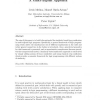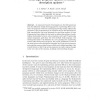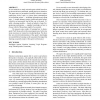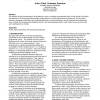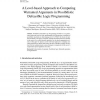125
click to vote
DAGSTUHL
2003
15 years 3 months ago
2003
In this chapter, we summarize the research on querying inconsistent databases we have been conducting over the last five years. The formal framework we have used is based on two c...
108
click to vote
EUSFLAT
2001
15 years 3 months ago
2001
The aim of this paper is to build a formal model for similarity-based fuzzy unification in multi-adjoint logic programs. Specifically, a general framework of logic programming whi...
127
click to vote
DAGSTUHL
2004
15 years 3 months ago
2004
In the last years we have developed a platform for the realization of embodied (conversational) agents, in a distributed logic programming framework. In this paper we will present...
124
click to vote
CLIMA
2004
15 years 3 months ago
2004
An important branch of investigation in the field agents has been the definition of high level languages for representing effects of actions, the programs written in such languages...
112
click to vote
AAAI
2004
15 years 3 months ago
2004
We propose and study extensions of logic programming with constraints represented as generalized atoms of the form C(X), where X is a finite set of atoms and C is act constraint (...
110
click to vote
OWLED
2007
15 years 3 months ago
2007
Abstract. We describe a system in which Contextual Logic Programming is used as a mediator for knowledge modeled by ontologies. Our system provides the components required to behav...
135
click to vote
IJCAI
2007
15 years 3 months ago
2007
Integrating description logics (DL) and logic programming (LP) would produce a very powerful and useful formalism. However, DLs and LP are based on quite different principles, so ...
115
click to vote
ICMLA
2007
15 years 3 months ago
2007
In our research we study rational agents which learn how to choose the best conditional, partial plan in any situation. The agent uses an incomplete symbolic inference engine, emp...
FECS
2007
15 years 3 months ago
2007
The adoption of logic programming in an introductory course on computer programming offers several rewards. The higher al level of this programming paradigm guides students to an ...
120
click to vote
COMMA
2008
15 years 3 months ago
2008
Abstract. Possibilistic Defeasible Logic Programming (P-DeLP) is an argumentation framework based on logic programming which incorporates a treatment of possibilistic uncertainty a...

